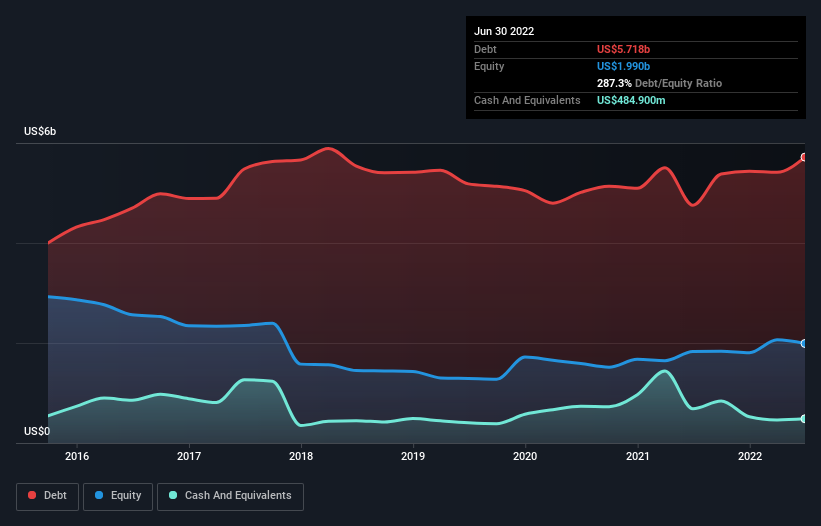
The external fund manager backed by Berkshire Hathaway's Charlie Munger, Li Lu, makes no bones about it when he says 'The biggest investment risk is not the volatility of prices, but whether you will suffer a permanent loss of capital.' When we think about how risky a company is, we always like to look at its use of debt, since debt overload can lead to ruin. As with many other companies Kennedy-Wilson Holdings, Inc. (NYSE:KW) makes use of debt. But the real question is whether this debt is making the company risky.
When Is Debt Dangerous?
Generally speaking, debt only becomes a real problem when a company can't easily pay it off, either by raising capital or with its own cash flow. Ultimately, if the company can't fulfill its legal obligations to repay debt, shareholders could walk away with nothing. However, a more frequent (but still costly) occurrence is where a company must issue shares at bargain-basement prices, permanently diluting shareholders, just to shore up its balance sheet. Of course, debt can be an important tool in businesses, particularly capital heavy businesses. When we examine debt levels, we first consider both cash and debt levels, together.
Check out our latest analysis for Kennedy-Wilson Holdings
What Is Kennedy-Wilson Holdings's Debt?
As you can see below, at the end of June 2022, Kennedy-Wilson Holdings had US$5.72b of debt, up from US$4.76b a year ago. Click the image for more detail. However, it also had US$484.9m in cash, and so its net debt is US$5.23b.

How Healthy Is Kennedy-Wilson Holdings' Balance Sheet?
Zooming in on the latest balance sheet data, we can see that Kennedy-Wilson Holdings had liabilities of US$604.2m due within 12 months and liabilities of US$5.73b due beyond that. On the other hand, it had cash of US$484.9m and US$225.5m worth of receivables due within a year. So it has liabilities totalling US$5.62b more than its cash and near-term receivables, combined.
This deficit casts a shadow over the US$2.11b company, like a colossus towering over mere mortals. So we'd watch its balance sheet closely, without a doubt. After all, Kennedy-Wilson Holdings would likely require a major re-capitalisation if it had to pay its creditors today.
We measure a company's debt load relative to its earnings power by looking at its net debt divided by its earnings before interest, tax, depreciation, and amortization (EBITDA) and by calculating how easily its earnings before interest and tax (EBIT) cover its interest expense (interest cover). This way, we consider both the absolute quantum of the debt, as well as the interest rates paid on it.
Weak interest cover of 0.72 times and a disturbingly high net debt to EBITDA ratio of 17.1 hit our confidence in Kennedy-Wilson Holdings like a one-two punch to the gut. The debt burden here is substantial. One redeeming factor for Kennedy-Wilson Holdings is that it turned last year's EBIT loss into a gain of US$145m, over the last twelve months. There's no doubt that we learn most about debt from the balance sheet. But ultimately the future profitability of the business will decide if Kennedy-Wilson Holdings can strengthen its balance sheet over time. So if you're focused on the future you can check out this free report showing analyst profit forecasts.
But our final consideration is also important, because a company cannot pay debt with paper profits; it needs cold hard cash. So it's worth checking how much of the earnings before interest and tax (EBIT) is backed by free cash flow. Over the last year, Kennedy-Wilson Holdings reported free cash flow worth 10% of its EBIT, which is really quite low. For us, cash conversion that low sparks a little paranoia about is ability to extinguish debt.
Our View
To be frank both Kennedy-Wilson Holdings's interest cover and its track record of staying on top of its total liabilities make us rather uncomfortable with its debt levels. Having said that, its ability to grow its EBIT isn't such a worry. After considering the datapoints discussed, we think Kennedy-Wilson Holdings has too much debt. That sort of riskiness is ok for some, but it certainly doesn't float our boat. There's no doubt that we learn most about debt from the balance sheet. However, not all investment risk resides within the balance sheet - far from it. To that end, you should learn about the 4 warning signs we've spotted with Kennedy-Wilson Holdings (including 2 which are significant) .
At the end of the day, it's often better to focus on companies that are free from net debt. You can access our special list of such companies (all with a track record of profit growth). It's free.
Valuation is complex, but we're here to simplify it.
Discover if Kennedy-Wilson Holdings might be undervalued or overvalued with our detailed analysis, featuring fair value estimates, potential risks, dividends, insider trades, and its financial condition.
Access Free AnalysisHave feedback on this article? Concerned about the content? Get in touch with us directly. Alternatively, email editorial-team (at) simplywallst.com.
This article by Simply Wall St is general in nature. We provide commentary based on historical data and analyst forecasts only using an unbiased methodology and our articles are not intended to be financial advice. It does not constitute a recommendation to buy or sell any stock, and does not take account of your objectives, or your financial situation. We aim to bring you long-term focused analysis driven by fundamental data. Note that our analysis may not factor in the latest price-sensitive company announcements or qualitative material. Simply Wall St has no position in any stocks mentioned.
About NYSE:KW
Average dividend payer low.
Similar Companies
Market Insights
Community Narratives




